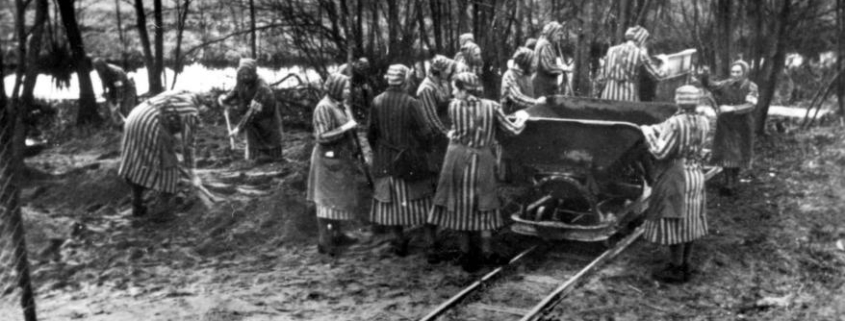How Could God Allow the Holocaust?
The past century has been marked by horrors that challenge the very notion of a just and benevolent God. In the shadow of Auschwitz, the Jewish world reckoned with the depths of human cruelty, and as a result, many turned to secularism or non-theistic expressions of spirituality. Why follow a Jewish tradition and a God who allowed the Holocaust? More recently, the brutal attacks of October 7 against Israel have added another layer of grief and bewilderment to a memory already burdened with suffering. Why has God allowed antisemitism to get out of control all over again?
The Abyss of Meaninglessness
The initial reaction to such widespread suffering is often a crisis of faith. The Israeli poet Yehuda Amichai, in his poem After Auschwitz, powerfully captures this sentiment.1 He bluntly states, “After Auschwitz, no theology” remains. Amichai writes that Holocaust victims had on their arms the “telephone numbers of God, numbers that do not answer.” Instead, he says God has become like those who perished in the ovens: he is without the likeness of a body—a subversive allusion to Maimonides’s Thirteen Principles in order to claim God’s nonexistence. Richard Rubenstein, a Jewish atheist, echoes this despair, asserting that “omnipotent Nothingness is Lord of all creation.”2 This sentiment, though deeply painful, represents a profound philosophical shift in segments of the Jewish community since the Holocaust: the rejection of any objective moral framework grounded in the God of Israel, because he cannot exist if such evil suffering also exists.
The underlying sentiment here is that the Holocaust was an atrocity, a catastrophe, and a moral evil. The Nazis of the 1940s were perpetuating and Hamas members in the 2020s are perpetrating immoral, evil actions toward Jewish people. Supposedly, their evil actions, and the suffering they bring upon innocent Jewish people, cannot be explained if a good God exists.
This rejection of God, however, also carries within it a profound internal contradiction. If there is no God, no transcendent authority, no ultimate lawgiver, then what basis do we have for declaring the Holocaust—or any act of barbarity—truly evil? If there is no God who stands as the model and perfection of goodness, then how can we account for the objective words good and evil? Does everything reduce to the subjective words of we like this, and we don’t like that?
The Collapse of Human Law
To illustrate this point, consider the historical context of the Holocaust. In their Final Solution, the Nazis operated within the German legal system, first codified in the “Nuremberg Laws” of 1935 before moving onto even more heinous legislation. The Nuremberg Laws defined who was a “pure” German and who was not, based on arbitrary standards of ancestry. These laws, meticulously documented and brutally enforced, stripped Jewish people of their rights, their citizenship, and ultimately, their humanity. Within the framework of German law at the time, these actions were legal.
This raises a critical question: by what authority can we, as twenty-first-century non-Germans, condemn these actions as objectively wrong? The German state, led by the Nazis, was following German law, and there was no higher law in the land. If countries are allowed to elect their own leaders and enact their own laws, then are we being cultural imperialists to condemn the Nazis for their own laws?
Of course not—that is preposterous. What the Nazis did was evil. But why? That’s the key question.
If each society is allowed to come up with their own standards of right and wrong, then there is no objective basis for condemning the actions of another society, no matter how brutal. Who is to say, as one Jewish writer put it, that the six million Jewish lives lost during the Holocaust were inherently more valuable than six million ants?3 The answer, according to the logic of an atheistic worldview, is no one. The arbitrary assignment of “value” or “worth” becomes the prerogative of the strongest power—a terrifying proposition with devastating implications.
On the contrary, the widespread intuition that the Holocaust was profoundly evil points to something beyond the realm of human opinion. It suggests a deeply embedded sense of right and wrong, a moral compass that transcends cultural boundaries and historical eras.
Morality Defined by the Victors?
After the Nazis were defeated, the victorious Allies agreed that the Nazis had perpetuated evil actions against the Jewish people and the world. But how could the Allies try the captured Nazi leaders in court? What system of laws would they be held accountable to? In 1945, the “Nuremberg Trials” attempted to address this very issue. The Allied prosecutors asserted that the Nazis had committed “crimes against humanity.” Encyclopedia Britannica says, “The concept of crimes against humanity embodies the idea that individuals who either make or follow state policy can be held accountable by the international community.”4
But what gives the “international community” the right to decide that a “crime against humanity” has been committed or to call it wrong? The Nuremberg Trial occurred only because the Allied forces won World War II. Had the Axis won, the “international community” would have been forced to agree that the Holocaust was good.
Herein lies the problem with defining “good” through human systems and popular agreement: it is arbitrary, shifting with whoever is in power, ultimately a popularity contest of morality by the victors.
A second problem is known as the “Reformer’s Paradox.” If power defines what is right, then no one ought to speak truth to power. Political power defines what is good and evil. If power truly makes right, then every moral reformer who challenges the status quo—such as Martin Luther King Jr. advocating for civil rights, or prophets in the Hebrew Bible denouncing injustice—is, by definition, evil. They are rebelling against the established order, disrupting the existing power structure. Yet, we know this line of thinking cannot be correct. Martin Luther King Jr. advocating civil rights was a good thing.
Without a transcendent lawgiver, morality collapses into mere preference, a collection of subjective opinions squelched by the opinion of whatever human power is currently at the top. If power ultimately dictates morality, then the Nazi laws, however horrific, were simply the expression of their rightful dominance. Their actions were right, until a bigger power came and defined them as wrong. Again, we know this cannot be correct.
The Need for a Transcendent Good
There is a reason why Israel’s prophetic tradition and the New Testament recognized that human political power cannot be the definer of goodness. Each recognized the fallibility of the human soul and the devastating ability of power to corrupt even the best of human intentions. Goodness cannot be defined by humanity; humans can only be called good to the degree that they mimic and model a higher, transcendental Good. That transcendent standard of righteousness and justice and holiness is not a human law or a written document, but rather the very nature of God himself. As David said of humans, “There is no one who does good, not even one” (Psalm 14:3). Likewise, Yeshua says, “No one is good but God alone” (Mark 10:18).
In Jewish tradition, God is the ultimate Lawgiver and the source of all morality, justice, and goodness. His perfection never changes, nor does his goodness, and thus he provides humanity with an unchanging anchor for knowing good and evil.
This is not to say that we can perfectly understand God’s character or fully grasp his purposes. The point is that morality is not arbitrary but is rooted in his very being. The commands he gives us are expressions of his nature, and living according to those commands is an expression of our inherent dignity as beings created in His image (Gen 1:27). The Nazis were evil not because they transgressed the majority opinion of the international scene; they were evil because they transgressed the standards of a good and perfect God.
Faith in the Face of the Unanswered “Why”
We can only partially grasp why God allows suffering, but his existence provides a foundation for understanding what suffering is: a deviation from his goodness. The fact that the Holocaust or October 7th happened, that innocent people suffered unimaginable horrors, does not disprove God’s existence; rather, by recognizing the horrors as evil, we implicitly affirm the existence of a good God.
This good God also has a plan to fix what is broken and to heal hearts hurting from suffering. As followers of Yeshua, we can take comfort in how God has sent his Messiah to suffer along with us and make us whole. As Isaiah wrote of him over 700 years before he came, “Surely our griefs He Himself bore, and our sorrows He carried” (Isaiah 53:4a). In carrying our sorrows, Yeshua does not just transfer misery from one place to the next; he heals us and brings us shalom: “The chastening for our well-being fell upon him, and by his scourging we are healed” (Isaiah 53:5b). Countless Jewish and Gentile followers of Yeshua can testify to this healing in their lives.
While we may not have a complete understanding of God’s purposes, Scripture beckons us to hold onto the unshakable foundation of God’s character, His faithfulness, and His promise to ultimately restore all things through his Messiah, Yeshua. It is through him that we know what good is: “In Your light we see light” (Psalm 36:9).
Footnotes
- Yehuda Amichai, “After Auschwitz,” trans. Chana Bloch and Chana Kronfeld (The Atlantic Online, November 1999), https://www.theatlantic.com/past/docs/unbound/poetry/antholog/amichai/auschwitz.htm.
- Quoted in Barry L. Leventhal, “Holocaust Apologetics: Toward A Case For The Existence Of God,” Christian Apologetics Journal 1 (1998): 1.
- Leventhal, 7.
- Richard Vernon, “Crime against Humanity,” Encyclopedia Britannica, Noet Edition (Chicago, IL: Encyclopædia Britannica, 2016).









